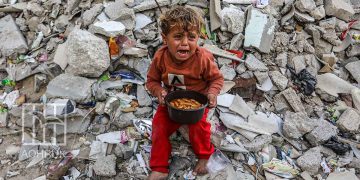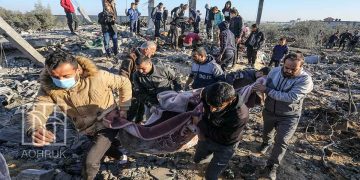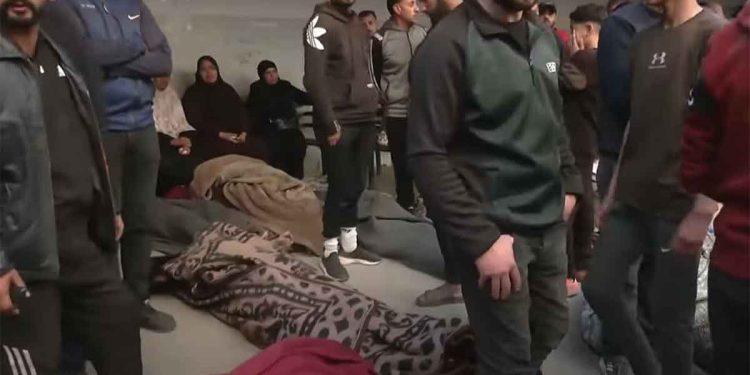Thirty Palestinian civilians, including many women and children, were killed in a series of Israeli airstrikes carried out in the early hours of Friday across various parts of the Gaza Strip. The attacks targeted residential homes and displacement sites, resulting in two harrowing massacres that add to the growing record of war crimes against the civilian population in the besieged territory.
According to local medical sources, the strikes were among the most intense in recent days and form part of an ongoing campaign of collective destruction that has now entered its nineteenth consecutive month, amid continued international silence and the failure of global institutions to halt the violence.
In northern Gaza, a heavy airstrike on the al-Miqdad family home in the Tel al-Zaatar neighbourhood of Jabalia killed 10 family members, including five children, and left several others critically injured. In the same area, an airstrike on a displacement tent in al-Tuwam killed two civilians and wounded six others. Another young man, Mohammed Abu Rukbah, was also killed in a separate attack on a gathering of civilians in Jabalia.
In southern Gaza, an Israeli airstrike targeted the Baraka family home and surrounding houses in Bani Suheila, east of Khan Younis, killing 10 civilians—mostly women—in the second massacre within just a few hours. Additionally, two more civilians were killed in an air raid that struck the Abu Akar family home near Al-I’tisam stadium in Khan Younis.
These recurring attacks are part of a systematic pattern of deliberate targeting of Palestinian civilians that meets the legal definition of genocide under the United Nations Convention on the Prevention and Punishment of the Crime of Genocide. The Convention defines genocide as acts committed with the intent to destroy, in whole or in part, a national, ethnical, racial or religious group, including killing and inflicting serious bodily or mental harm.
The targeting of homes filled with women and children, alongside strikes on displacement areas devoid of military presence, reflects a deliberate intent to inflict mass harm. Such actions cannot be justified under the laws of armed conflict and point to a calculated policy aimed at eradicating the Palestinian population in Gaza or subjecting them to large-scale punitive harm.
The repeated killing of entire families without warning or prior notice further confirms the deliberate nature of collective punishment. These acts are explicitly prohibited under international law and demonstrate an approach that disregards the principles of proportionality and distinction—core tenets of humanitarian law—and amounts to a policy of annihilation.
The international community, including the United Nations and the International Criminal Court, bears an urgent responsibility to intervene to stop the ongoing genocide in Gaza and to activate mechanisms of accountability to bring perpetrators to justice. Immediate protection measures must also be implemented for civilians, alongside ensuring unrestricted humanitarian and medical aid to the affected areas.
The ongoing international silence in the face of these atrocities not only constitutes complicity but actively contributes to the entrenchment of impunity. It undermines the foundations of international law, which were established to prevent mass extermination, and leaves over two million people in Gaza at risk of continued genocide under a suffocating blockade and relentless assault.



























